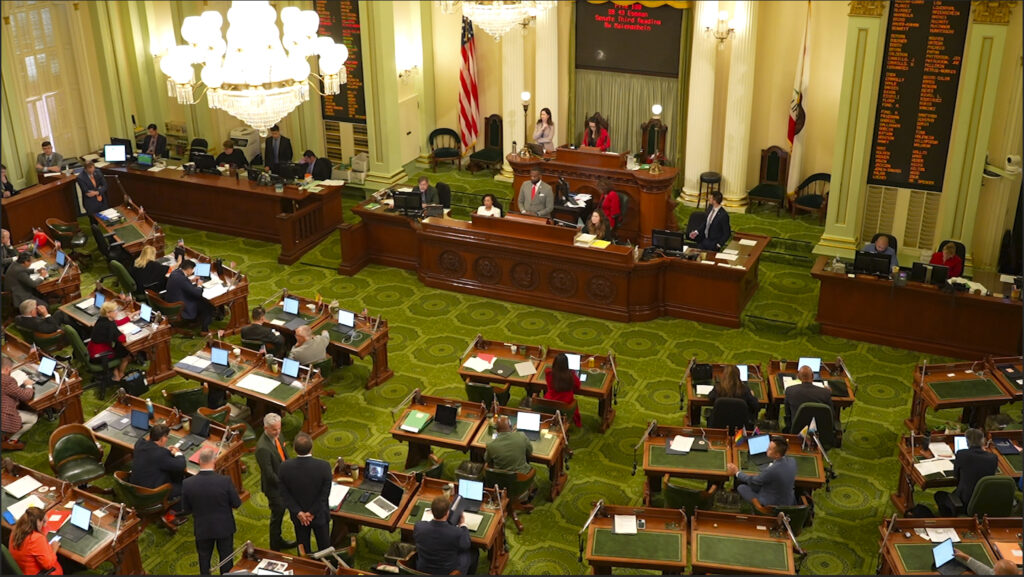Legislation that would remove one of the last tests teachers are required to take to earn a credential in California passed the Senate Education Committee unanimously Wednesday with little opposition.
Senate Bill 1263, sponsored by the California Teachers Association, will now move to the Senate Appropriations Committee. If ultimately approved by the Legislature, it will do away with the California Teaching Performance Assessment, known as the CalTPA.
The assessment requires that teachers demonstrate their competence via video clips of instruction and written reflections on their practice.
Eliminating the assessment would encourage more people to enter the teaching profession, said Sen. Josh Newman, D-Fullerton, author of the bill and chairman of the Senate Education Committee at Wednesday’s hearing.
“Despite its well-intentioned purpose, the demands associated with preparing for the TPA have actually had the perverse impact of reducing the overall quality of teacher preparation by undermining the capacity of teacher candidates to focus on what’s most important, which is their clinical practice,” Newman said.
He said the performance assessments duplicate other requirements teachers must fulfill to earn a credential, including proving subject-matter competency, taking teacher preparation courses, being assessed for reading instruction proficiency and completing 600 hours of clinical experience.
Brian Rivas, senior director at The Education Trust‒West, a nonprofit education research and advocacy organization, spoke in opposition to the legislation.
“We concluded when we reviewed the research that teaching performance assessments are the best available measure of teacher preparedness and whether or not a candidate is prepared to enter a classroom,” Rivas said.
The test offers a common standard to measure how well credentialing programs are preparing teacher candidates and could mean fewer prepared teachers in schools serving low-income students, which are already disproportionately taught by novice teachers, he said.
California moved away from standardized testing for teacher candidates in recent years as the teacher shortage worsened.
In July 2021, legislation gave teacher candidates the option to take approved coursework instead of the California Basic Education Skills Test, or CBEST, or the California Subject Examinations for Teachers, or CSET. In January’s tentative budget, Gov. Gavin Newsom proposed eliminating the CBEST and allowing the completion of a bachelor’s degree to satisfy the state’s basic skills requirement.
Around the same time, the state also has joined a national effort to change how reading is taught in schools, focusing on a method that teaches students to decode words by sounding them out, a process known as phonics.
Last summer, Senate Bill 488 passed the state Legislature. The bill replaced the unpopular Reading Instruction Competence Assessment, also known as RICA, with a literacy performance assessment based on a new set of literacy standards and Teaching Performance Expectations centered on phonics and other foundational reading skills. The assessment was scheduled to be piloted in the next few months. The CTA supported the bill.
Union leaders later said that a survey of its membership persuaded them to change course and to sponsor SB 1263, which would repeal the performance assessment.
Senate Bill 1263 doesn’t remove the requirement that candidates for a preliminary, multiple-subject or education specialist credential pass a test that evaluates their ability to teach reading, meaning the passage of SB 1263 could result in the RICA remaining beyond the 2025 date when it was scheduled to be abandoned.
The RICA has been a major hurdle for teacher candidates for years. About a third of all the teacher candidates who take the test fail the first time, according to state data collected between 2012 and 2017. Critics also have said that the test is outdated, racially biased and has added to the state’s teacher shortage.
The California Teachers Association also opposed Assembly Bill 2222, which would have required California teachers to use “science of reading” instruction in their classrooms. Last week the bill died without a hearing.
CTA representative Mandy Redfern spoke in support of Senate Bill 1263 Wednesday, calling the performance assessment a barrier to a diverse teacher workforce.
“Over the past 20 years, the TPA, or the teacher performance assessment, has evolved into a high-stakes, time-consuming costly barrier for aspiring teachers,” Redfern said.
“The current iteration of the TPA has been proven to be ineffective at preparing educators for the realities of the classroom,” she said. “The CTC’s data shows that TPAs disproportionately harm aspiring BIPOC (Black, Indigenous and other people of color) educators.”
The most recent passing rates on the assessment for people of color are not significantly different from others who took the test, said Mary Vixie Sandy, Commission on Teacher Credentialing executive director, at the hearing. For example, Black teacher candidates had a 75% first-time pass rate and a 95% ultimate pass rate, which is right within the norm, on average with the whole population of teachers who took the assessment, Sandy said.
The bill would also do away with oversight of literacy instruction in teacher preparation programs mandated by Senate Bill 488, authored by Sen. Susan Rubio, D-West Covina, in 2021.







